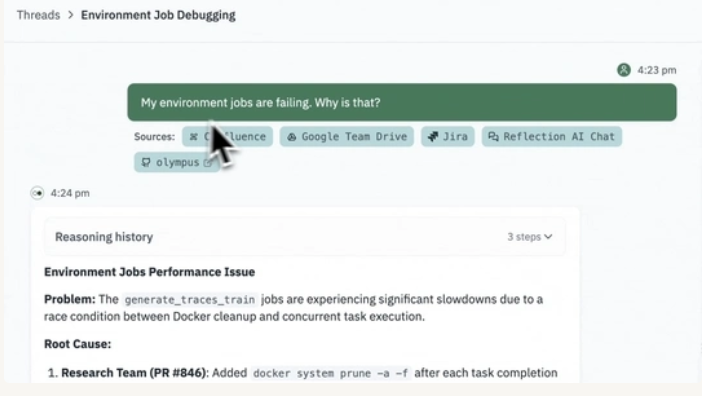Mike Wheatley
2025-07-16 21:42:00
siliconangle.com
Artificial intelligence startup Reflection AI Inc. is looking to change the way AI agents are designed and built, with a view to achieving so-called “superintelligence” much faster.
The company has developed an autonomous agent known as Asimov, introduced today. It has been trained to understand how software is created by ingesting not only code, but the entirety of a business’ data to try to piece together why an application or system does what it does.
In an interview with Wired.com, Reflection AI co-founder and Chief Executive Misha Laskin said that Asimov reads everything from emails to slack messages, project notes to documentation, in addition to the code, to learn everything about how and why the app was created. He explained that he believes this is the simplest and most natural way for AI agents to become masters at coding.
It’s a stark contrast to how AI agents work at most other AI companies, where they tend to be more focused on code generation than actually understanding the software they help to build. According to Laskin, the goal is to make AI agents more useful in a team setting. “We are in this kind of semi-autonomous phase, where agents are just starting to work,” he said.
Asimov is actually a collection of multiple smaller AI agents that are deployed inside customer’s cloud environments so that the data remains within their control. Asimov’s agents then cooperate with one another to try and understand the underlying code of whatever piece of software they’ve been assigned to, so they can answer any questions that human users might have about it. There are several smaller agents designed to retrieve the necessary data, and they work with a larger “reasoning” agent that collects all of their findings and tries to generate coherent answers to user’s questions.
Reinforcement learning meets deep research
Reflection AI’s other co-founder, Chief Technology Officer Ioannis Antonoglou, previously served as a founding engineer at Google LLC’s AI research unit DeepMind, where he worked with Laskin on a project that sought to teach AI models to reason and play games. He was part of the team that developed AlphaGo, an AI system that learned how to play the ancient board game Go and defeat some of the world’s best players.
To teach AlphaGo, Antonoglou developed a groundbreaking training technique known as reinforcement learning, where AI models are taught their desired behavior using positive feedback to reward correct responses, and negative feedback when they make a mistake. The technique has since been implemented in large language model training, helping models to generate more coherent responses to user prompts.
Reflection AI has applied reinforcement learning to Asimov, but instead of teaching it how to play Go, it’s focused on enhancing its proficiency in coding. And by feeding it with not only code, but also emails, messages and other documents from those who built the software, the company provides Asimov with much more context about it. By combining these methods, Reflection AI believes the agent will eventually be able to create the same software independently.
Antonoglou said the approach is not too dissimilar from Google’s Deep Research agent, which scours hundreds or even thousands of sources from across the web to create comprehensive reports on almost any subject.
“We’ve built something like Deep Research, but it’s for your engineering systems,” he said. “We’ve seen that in big engineering teams, a lot of the knowledge is actually stored outside of the codebase.”
Promising, but unproven
The results so far have been encouraging, at least if the company itself is to be believed. An internally conducted survey found that developers of large open-source software projects showed a preference for Asimov’s responses and code outputs to 82% of their prompts. In contrast, they only liked the responses from Anthropic PBC’s Claude Sonnet 4 model 63% of the time.

Of course, that research is far from comprehensive, since there’s no comparison with any of OpenAI’s models, or those from coding-specific models such as GitHub’s CoPilot or Cognition AI Inc.’s Devin, for example.
Daniel Jackson, a professor of computer science at the Massachusetts Institute of Technology, told Wired that Asimov is a promising idea, and said he likes the idea of gathering a much broader set of data to inform its coding outputs. But he said it’s still unproven, and he also raised concerns about privacy, noting that it will be “reading all these private messages” between developers and their colleagues.
In any case, Reflection AI believes it’s on the right track. It says it ultimately sees Asimov evolving to become a kind of coding “oracle” for businesses, leveraging its comprehensive knowledge of everything they do to autonomously build new software and products on their behalf.
Image: SiliconANGLE/Microsoft Designer
Support our open free content by sharing and engaging with our content and community.
Join theCUBE Alumni Trust Network
Where Technology Leaders Connect, Share Intelligence & Create Opportunities
11.4k+
CUBE Alumni Network
C-level and Technical
Domain Experts
Connect with 11,413+ industry leaders from our network of tech and business leaders forming a unique trusted network effect.
SiliconANGLE Media is a recognized leader in digital media innovation serving innovative audiences and brands, bringing together cutting-edge technology, influential content, strategic insights and real-time audience engagement. As the parent company of SiliconANGLE, theCUBE Network, theCUBE Research, CUBE365, theCUBE AI and theCUBE SuperStudios — such as those established in Silicon Valley and the New York Stock Exchange (NYSE) — SiliconANGLE Media operates at the intersection of media, technology, and AI. .
Founded by tech visionaries John Furrier and Dave Vellante, SiliconANGLE Media has built a powerful ecosystem of industry-leading digital media brands, with a reach of 15+ million elite tech professionals. The company’s new, proprietary theCUBE AI Video cloud is breaking ground in audience interaction, leveraging theCUBEai.com neural network to help technology companies make data-driven decisions and stay at the forefront of industry conversations.
Enjoy the perfect blend of retro charm and modern convenience with the Udreamer Vinyl Record Player. With 9,041 ratings, a 4.3/5-star average, and 400+ units sold in the past month, this player is a fan favorite, available now for just $39.99.
The record player features built-in stereo speakers that deliver retro-style sound while also offering modern functionality. Pair it with your phone via Bluetooth to wirelessly listen to your favorite tracks. Udreamer also provides 24-hour one-on-one service for customer support, ensuring your satisfaction.
Don’t miss out—get yours today for only $39.99 at Amazon!
Help Power Techcratic’s Future – Scan To Support
If Techcratic’s content and insights have helped you, consider giving back by supporting the platform with crypto. Every contribution makes a difference, whether it’s for high-quality content, server maintenance, or future updates. Techcratic is constantly evolving, and your support helps drive that progress.
As a solo operator who wears all the hats, creating content, managing the tech, and running the site, your support allows me to stay focused on delivering valuable resources. Your support keeps everything running smoothly and enables me to continue creating the content you love. I’m deeply grateful for your support, it truly means the world to me! Thank you!
|
BITCOIN
bc1qlszw7elx2qahjwvaryh0tkgg8y68enw30gpvge Scan the QR code with your crypto wallet app |
|
DOGECOIN
D64GwvvYQxFXYyan3oQCrmWfidf6T3JpBA Scan the QR code with your crypto wallet app |
|
ETHEREUM
0xe9BC980DF3d985730dA827996B43E4A62CCBAA7a Scan the QR code with your crypto wallet app |
Please read the Privacy and Security Disclaimer on how Techcratic handles your support.
Disclaimer: As an Amazon Associate, Techcratic may earn from qualifying purchases.









































































































